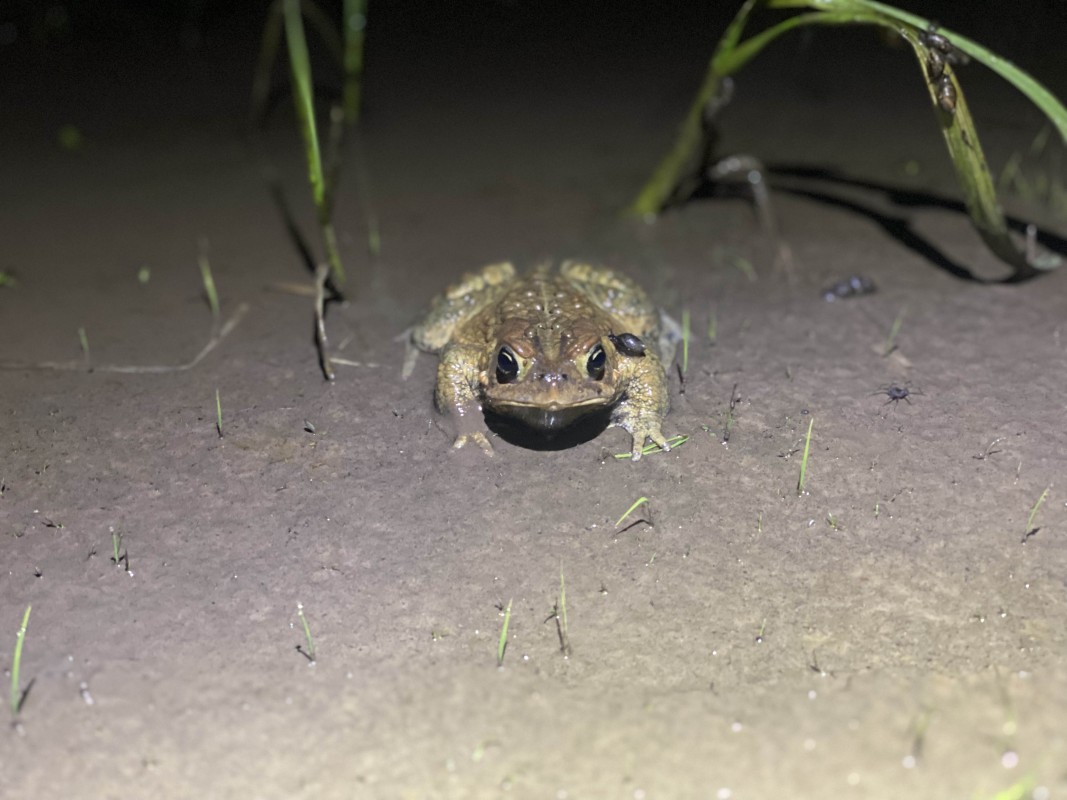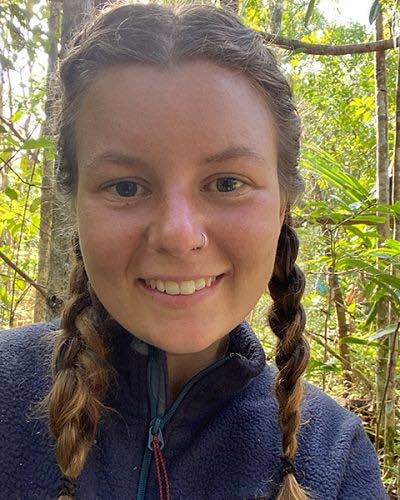Biologist explores the role of gut microbes in evolution and ecological adaptation
Research fellow Mariah Donohue focuses her research on two very different animals: lemurs and frogs

The gut does so much more than digest our food.
It has its own ecology, hosting a variety of microbes with different roles — helping extract nutrition from the food we eat, guiding the response of our immune system and even shaping our moods. These microbes may even play a role in evolution, according to research by Mariah Donohue, who recently joined Binghamton University’s Biological Sciences program as a PRODiG+ SUNY Fellow.
Originally from Queens, she earned a bachelor’s in anthropology and a master’s in biology at Stony Brook University, followed by a PhD in biology from the University of Kentucky.
Donohue studies how gut microbiomes shape the evolution of their animal hosts and the ecological niche they occupy. To examine these questions, she focuses on two very different animals: frogs in the northeastern United States and lemurs, a superfamily of primates found only on the island nation of Madagascar
The fellowship is a bridge to a faculty position. Over the next two years, Donohue will develop her own research program, applying for grants, publishing papers and mentoring undergraduates along the way.
In addition to research, a key component of the fellowship is supporting diversity, equity and inclusion within the sciences.
“Basically, we’re trying to make research inclusive for people who have been historically underrepresented or excluded from science,” Donohue said. “That includes the Malagasy people in Madagascar, as well as anyone in a minoritized group here at Binghamton University.”
Gut diversity and environmental health
Donohue has studied lemurs for around a decade, and her research shows a deep coevolution between the primates and gut microbes.
“That also extends to all mammals. We have a core set of gut microbes that have co-evolved for millions of years with our mammalian lineage,” she explained. “I look at the shared microbes among many different species and their functions.”
Lemurs are also incredibly diverse, with more than a hundred species in Madagascar, and have developed similarly diverse strategies to cope with the harsh island environment.
Microbes can evolve more quickly than the host genome, which makes microbial adaptation a smart survival strategy. That’s especially important to lemurs; as long-lived primates, their own genetic evolution wouldn’t adapt quickly enough to a changing world.
“If you’re an animal and you have to adapt or acclimate to changing conditions quickly, microbial helpers are the way to go,” Donohue said.
During her master’s program, she received a grant from the National Geographic Foundation that allowed her to compare the microbiome of lemurs living in disturbed forest fragments with those living in healthy, continuous forests. Those living in degraded environments had reduced microbial diversity — a finding that bears a strong resemblance to what has been dubbed the “great extinction” of the human microbiome.
Humans in hunter-gatherer societies have significantly more microbial diversity than those living in industrial environments. Diet plays a role, but so do sanitation practices. Soap, antibiotics and other medications can cause extinctions of gut microbes, which may contribute to the development of autoimmune disease.
“How you live plus your genetics determines what microbiome you’re going to have,” Donohue said. “A lot of my work has focused on determining the impact of each of those factors.”
While Donohue also had a long-time interest in amphibians, she added them to her research program in response to a different kind of microbial evolution: the coronavirus pandemic. Wild lemurs are found only on Madagascar, and global travel shut down during the pandemic. Having a research subject closer to home is a sensible option.
Amphibians are interesting in their own right: As cold-blooded animals, the external environment determines their internal temperature, which makes them sensitive to the impact of climate change.
“That could be really interesting for questions about the role of the microbiome,” Donohue said.
Binghamton University’s Nature Preserve has a respectable amount of amphibian biodiversity, with more than 10 species of frogs and salamanders. Donohue plans to get baseline assessments of their microbiomes and then develop a long-term study of how those microbiomes change with the climate.
In addition to frogs in the Nature Preserve, she hopes to continue her Madagascar research with a study of bamboo lemurs. These primates consume 12 to 40 times the lethal amount of cyanide daily as part of their regular diet — the giant Malagasy bamboo — with no ill effects.
“There’s been a lot of research trying to figure out how those lemurs can thrive with this kind of diet, and everyone is still scratching their head,” she said. “Can we look at the microbiome?”

